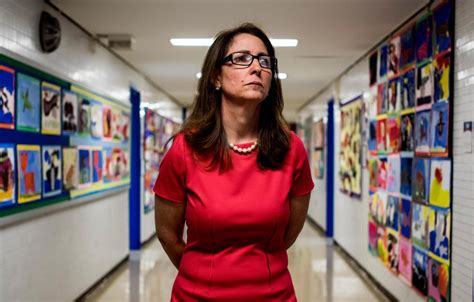A Quote by Spike Lee
I am very fortunate I can send my kids to private school, but everybody does not have the money. If you cannot get your kid in a good school today, your kids are going to be behind the eight ball.
Related Quotes
All parents want to send their children to the best possible schools. But because a good school is a relative concept, a family cannot achieve its goal unless it outbids similar families for a house in a neighborhood served by such a school. Failure to do so often means having to send your kids to a school with metal detectors at the front entrance and students who score in the 20th percentile in reading and math. Most families will do everything possible to avoid having to send their kids to a school like that. But because of the logic of musical chairs, they're inevitably frustrated.
The public schools in our neighborhood were so bad that the teachers in the school said you shouldn't send your kids here. My mother called around and found a school that was willing to give both me and my brother scholarship money. It's a classic story about black parents wanting more for their kids than they had for themselves.
I was a completely normal kid, the school nerd. In Year 8 and 9 I got picked on. I was a freak- no one understood me. I was the kid who wanted to be abducted by ET. Then all the losers left in Year 10. But I was quite good at school, and very artistic. In Year 11 it turned around. I became one of the coolest kids in school. I was in school musicals- the kid who could sing. It was bizzare. I loved school. It's an amazing little world. The rules inside the school are different from the outside world.
It's hard sometimes when you're in a regular high school, you just feel like the odd kid out. The great thing about going to an art school [is] it's kind of like it's all the odd kids. It's all the kids that don't fit in at their regular schools, because you're into something and excited about something that other kids really aren't into. When you go to art school, everybody's kind of on the same page.
I have seen a lot of men, for example, who will make a will and include their daughters whether they are married or not. And perhaps the greatest change of attitude is that today, at least in Kenya, if you don't send your child to school - unless it's a matter of poverty or religion, and it is not that there no schools - then people wonder, "why the hell don't you send your children to school?" Now that's a very big jump from when I was going to school and educating girls was an exception to the rule.
Before playing football, I didn't fit in anywhere. My parents didn't have a lot of money, which they spent on our education to send us to Catholic private school in Oakland, mostly black. The other kids had more money than I did. I started school early; I was young. So I'd come back to my hood and read.
And now life has become the future. Every moment of your life is lived for the future—you go to high school so you can go to college so you can get a good job so you can get a nice house so you can afford to send your kids to college so they can get a good job so they can get a nice house so they can afford to send their kids to college.
Minnesota is a state of public-spirited and polite people, where you can get a good cappucino and eat Thai food and find any book you want and yet live on a quiet tree-lined street with a backyard and send your kids to public school. When a state this good hits the jackpot, it can only be an inspiration to everybody.
What I'm asking people to do is to look at their lives, wherever they may be. I mean, you may be a housewife or a mother in Gauteng and you're driving your kid to school, you know, and you've got one kid in the back and you're driving 30 kilometres to school and 30 kilometres back, so 60 kilometres in a day, to take one child to school. Is there a possibility that you can put a few more kids, some friends' kids in the car, and start saving on those types of things?
Be cautious, understand the consequences of your decisions. You have to understand the consequences of every decision that you make. If you decide to be a writer, that's going to scale back your life, than when you decide to be an attorney. Y'know, if you send your kids to private school, then it's kind of like the federal budget, where if you spend money on one thing, but you have to cut on something else. So you just have to be aware, at all times, that every decision you make, has reverberations. And you have to understand those reverberations, and either you live with them, or you don't.
I want kids to be able to escape failing schools that trap them. And it's an unequal trapping of children. The most affluent find a way to escape. They move to a great suburban district or send their kid to a private school. The people who are trapped in the worst schools that have been terrible often for half a century? Those are the poorest kids.
How do you make your kids read more? It needs to be presented as a joy and a privilege to get to do it, and the kids should get to see you as a parent reading for your own pleasure. It's not something you send your kids off to do, 'Go into your room and read for 15 minutes or else.' It becomes a task then.






































